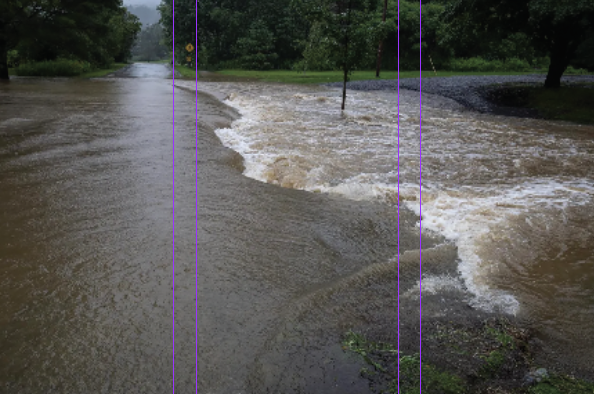By Emma Cotton/VTDigger
LUDLOW — At a meeting Thursday night, Nov. 9, designed to discuss climate resilience in towns hard-hit from the summer’s flooding, residents had many questions about the preparedness of their communities.
Was there an emergency plan in case local dams failed? Would sediment from flooding make local waterways unsafe for recreation? What should residents do if they saw machine operators removing wood debris from the river? What happens when the river’s path moves and is now running through a hillside neighborhood?
The panel presentation and community meeting, hosted at the Ludlow Town Hall by the Vermont Natural Resources Council, focused on ways to reduce river flooding during storms like the one that took place in July.
Panel members, including representatives from the Vermont Department of Environmental Conservation, Vermont River Conservancy, Connecticut River Conservancy, Black River Action Team and Trout Unlimited, spoke largely about conserving land in the river corridor.
If a flooded river has room to spread out into open land, its waters often sink into the landscape and slow down. Conversely, heavily managing a river to form straight, narrow or inflexible channels can create a firehose effect, making the water more powerful and capable of destroying infrastructure in its path, panel members said on Thursday.
“The rivers will always win. We’re not going to win. So we need to give them that space to move,” said panelist Karina Dailey, a restoration ecologist with the Vermont Natural Resources Council.
Vermont’s future is almost certain to bring more flooding. Scientists expect climate change to increase both the amount of precipitation in the state and the likelihood of extreme weather.
As towns across the state transition from clean-up to long-term planning, residents want to know how to move forward to avoid the worst impacts of flooding — and what resources exist to help them.
Ludlow resident Joanna Bombadil told panel members that she lives below town-owned flood control dams in Ludlow, but doesn’t know how to get information about their status or what to do if one fails.
“Going downtown felt a lot scarier than staying in my house,” she said, referring to the July flood, “but I’d like to know if my house would be washed away, or if the river would just kind of come down and spread out around it. So there are people who are beginning to — I guess my question is, are people beginning to look at these dams?”
Area resident Charlie James said he had planted trees on his property to help absorb flood waters from a brook that had jumped its banks into his backyard. But after his neighbor complained, the town took issue with his plantings, saying they had created a berm that would disturb the floodplain.
“Your example is showing us that you tried to do something that would help the river and it led to this extra hassle,” said Hayley Kolding, a conservation manager with Vermont River Conservancy. “And you’re wondering, what do I do next? I think for a lot of people, that would have been a barrier, so they wouldn’t have even tried to make it better.”
She encouraged others in similar situations to reach out to local conservation districts or river groups such as the Vermont River Conservancy to get technical support, advice and, possibly, funding.
Several attendees asked about machinery they had seen in local waterways after the flood, which were removing woody debris. Anyone working in the river needs permitting from the Dept. of Environmental Conservation, and the attendees wondered whether the department would permit the work in question, which cleared the river of debris that is usually considered beneficial because it slows and filters fast water.
The question led to a conversation about the state’s Rivers and Roads program, which provides training to road crews on how to appropriately manage rivers after floods. Attendees wanted to know whether the program is mandatory for all road crews. Panelists answered that the program is voluntary.
Marie Caduto, watershed coordinator with the Dept. of Environmental Conservation, said residents could encourage their town to send the road crews to the trainings.
It didn’t take long on Thursday night for the conversation to meander outside the scope of river restoration.
Area resident Margo Caulfield raised the idea of a statewide culvert clean-up day before expressing concerns about the availability of funding for residents to fix their homes from flood damage and bolster them against future flooding.
“People are just jumping in trying to do what they can do and asking questions later,” she said. “You know, we should have a better model statewide. We should have been prepared for this, and we weren’t. We should have learned from Irene. We did not.”

By Glenn Russell/VTDigger
Water from the Williams River in Ludlow flows over Fox Lane Extension on Monday, July 10.




